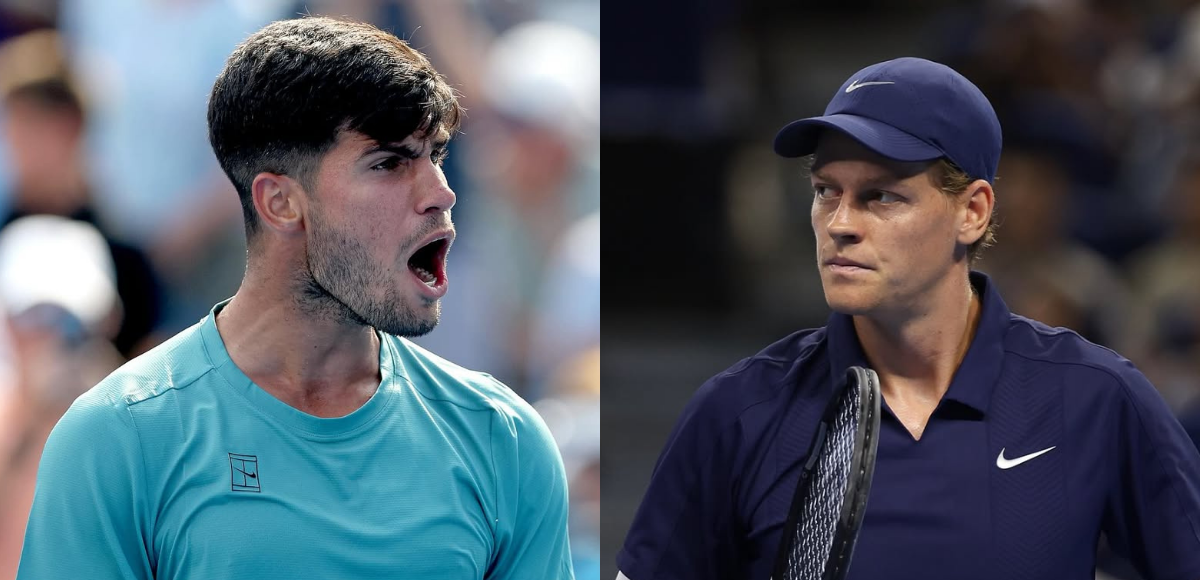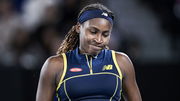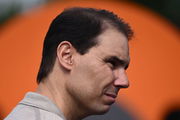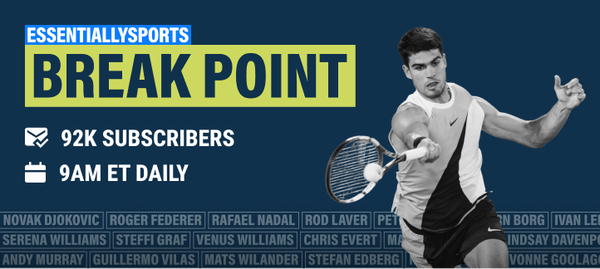
Imago
Credits: Imago

Imago
Credits: Imago
“I don’t know if the conditions are a bit slower or if they are just better at it. Making returns was hard. Now, they just stand there,” Roger Federer remarked on Served with Andy Roddick, stirring fresh debate on modern court speeds. As Carlos Alcaraz and Jannik Sinner continue to electrify every arena they enter, the conversation only intensifies. Even before Shanghai, Alexander Zverev had sounded off, saying, “I hate when (court speeds are) the same… they want Jannik (Sinner) and Carlos (Alcaraz) to do well every tournament.” Now, with Sinner reigning supreme in the Paris Masters, tournament director Cedric Pioline has stepped in, calling out the players’ double standards and fanning the flames of a debate that refuses to cool.
Watch What’s Trending Now!
Ahead of Sunday’s final between Félix Auger-Aliassime and Jannik Sinner, Pioline offered an honest insight into the decision-making process. “We do not have the possibility to ask for something specific by saying as for the CPI [court pace index], what was measured at 35, we can’t say we want 35.5, 36, or 37. We give a range. We want medium, fast, or something. We wanted to have a slower court as opposed to last year. This was crystal clear,” he stated firmly.
But Pioline didn’t stop there. He added a sharp observation about player behavior, hinting that many tend to complain even while succeeding. “But I also find it interesting to highlight something. As usual, as for every tournament, we had four semifinalists. Three of them expressed a comment either on the surface or on the balls. If they reached the semifinals in a Masters 1000, it’s already a performance per se,” he said, before referencing one player in particular. “Felix, he said the balls are c–p. This is what he said during his first round. What I said afterwards was what about the balls? Maybe they’re not that bad, are they?”
ADVERTISEMENT
As a former player himself, Pioline understands the frustrations professionals face when conditions don’t align with their preferences. Yet, he emphasized that the tone of criticism matters. “But then these are small discussions we have between the tournament director — I’m an ex-player, as you know — and with the players. I know how the players feel when they arrive in the new facility and venue and they discover the new playing circumstances, but then making a comment about another comment is not constructive,” he said, making his stance clear.

Imago
BEIJING, CHINA – SEPTEMBER 30: Jannik Sinner of Italy reacts in the Men s Singles Semifinal match against Alex De Minaur of Australia on day 9 of the 2025 China Open at the National Tennis Center on September 30, 2025 in Beijing, China. PUBLICATIONxNOTxINxCHN Copyright: xChinaxNewsxServicex 111594197623
Pioline continued, balancing empathy with authority. “But I know we have to sort out between the player discovering the conditions and making a comment without thinking about it, and something that is actually a well-founded comment. I think what we managed to establish is a good compromise for all playing styles,” he added, stressing that the current surface was designed to create fairness, not favor.
ADVERTISEMENT
Earlier in the week, Pioline had already addressed concerns about the court speed, revealing that “last year’s court was too fast.” The decision to slow things down was deliberate, he explained, aimed at aligning Paris’ conditions with those of the ATP Finals in Turin, allowing players to adapt ahead of the season’s climax.
Still, not everyone was pleased. Alexander Zverev, one of the most vocal critics, condemned the growing uniformity in court speeds across the tour. Daniil Medvedev and Alexander Bublik joined in, claiming that the Paris surface “was slower than clay,” an exaggeration that reflected their frustrations more than the actual data.
ADVERTISEMENT
Top Stories
Coco Gauff Faces Major Setback as Ranking Takes a Toll After Australian Open Exit

WATCH: Carlos Alcaraz Mobbed by Journalists Moments After Touching Down in Spain

Emma Navarro Raises Concerns as Hailey Baptiste Stuns at Abu Dhabi Open

Rafael Nadal Sets Boundary With Reporter During Australia Exit as Security Steps In

Jessica Pegula Calls Out Coco Gauff’s Critics After Racket Smash Controversy: “You Don’t Go”

Meanwhile, Félix Auger-Aliassime’s outburst after his opening match added more fire to the debate. “Honestly, the balls are terrible, they don’t bounce straight. When you try to keep the ball in the court, it’s okay, but as soon as you try to be precise on the serve or hit. It has to change. We need to find a solution, we’ve been talking about it since Covid, but every time, there’s no solution, we need to find one so that it gets better.”
As tensions flared, Jannik Sinner remained calm, offering a measured stance, reminding everyone that champions adapt, regardless of the surface beneath their feet.
ADVERTISEMENT
Jannik Sinner responds after Roger Federer urges major tennis change
Ahead of the China Open, Jannik Sinner, who has battled Carlos Alcaraz in three of the last four Grand Slam finals, responded to Roger Federer’s fiery debate over modern court speeds with calm precision and a composed tone that reflected his growing maturity on tour.
“The hard courts, they are at times very similar,” Sinner admitted. “At times, there are some small changes, a couple of changes. One tournament that comes up a bit is Indian Wells because the ball bounces very high. It’s a bit different how the ball reacts with the court, but yeah, if not, we have more or less similar game situations on the court.”
With his trademark composure, he continued, “This is how it has been for a long time, like this. I don’t know if there is going to be a change or not.” It was a response that neither denied nor inflamed, instead reflecting his steady approach to an ever-changing sport.
ADVERTISEMENT
Even as Alexander Zverev fueled the conversation by hinting at preferential conditions for Sinner and Alcaraz, the Italian quickly set the record straight. “You know, me and Carlos, we don’t make the courts. It’s not our decision. We try to adapt ourself in every situation. I feel like still every week is a bit different.”
In a sport where every surface sparks debate, Sinner’s words carried weight: balanced, unbothered, and quietly defiant.
ADVERTISEMENT
ADVERTISEMENT
ADVERTISEMENT
